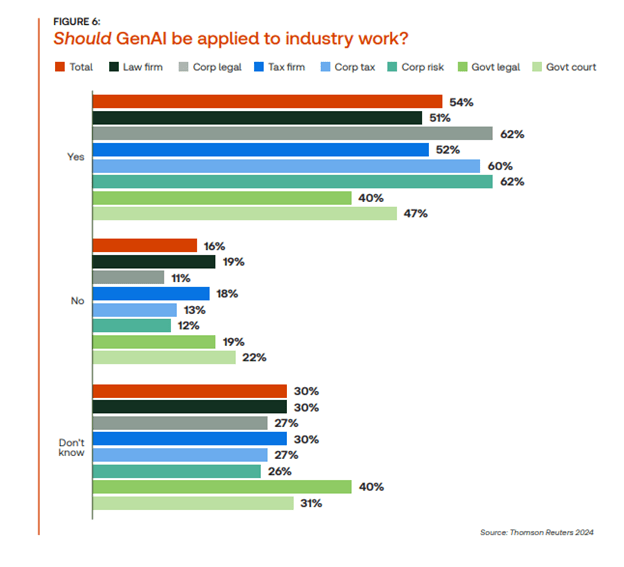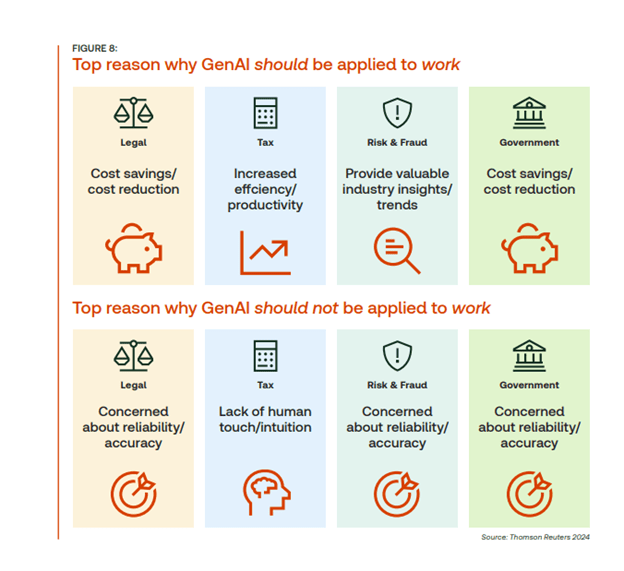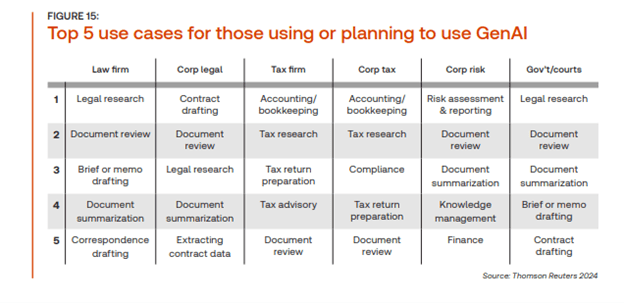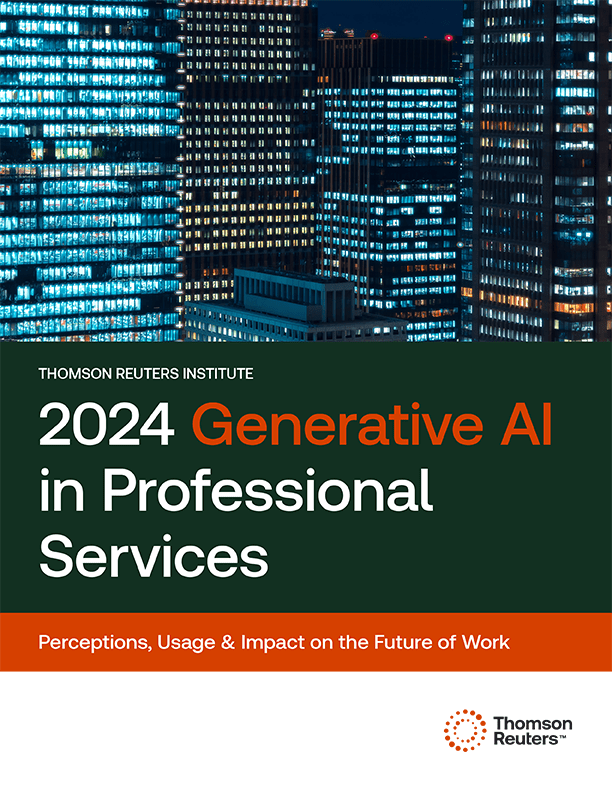Legal professionals in corporations, law firms, and government agencies continue to be curious about using generative artificial intelligence (GenAI) in their work, though they have hesitance about how to use it responsibly. That’s according to the 2024 Generative AI in Professional Services from the Thomson Reuters Institute.
The report includes data from 1,128 global legal, government, tax, accounting, risk, and fraud professionals. It looks at a range of considerations, including legal professionals’ attitudes toward whether GenAI can and should be applied to industry work, the reasons why or why not, and the use cases legal professionals envision for GenAI.
Jump to ↓
Can GenAI be applied to legal work?
Should GenAI be applied to legal work?
The argument in favor of GenAI for legal work
The case against GenAI in legal
Can GenAI be applied to legal work?
A full 81% of professionals believe that GenAI can be applied to industry work. That number is higher in law firms and corporate legal departments at 85%, and slightly lower in government agencies at 77%.

Should GenAI be applied to legal work?
On the question of whether GenAI should be used in industry work there was more hesitance. More than half said it should be applied to an industry’s work. This means that use cases are not only evident but should be an active part of regular job functions. Thirty percent simply weren’t sure.

Corporate legal departments were more likely to believe GenAI should be used in their work. There is a gap between their position – with 62% believing it should be used – and those of their outside counsel. Just over half of law firm professionals hold that belief. Law firms may experience pressure from their clients to look carefully at their GenAI options, as clients want to know they are receiving the efficiency benefits GenAI promises.
According to the report, government law agencies and courts were much more skeptical about GenAI. Just 40% of agencies and 47% of courts believe that GenAI should be applied to their work.
The argument in favor of GenAI for legal work
The rationale for using GenAI comes down to the business impact of the technology. Legal industry respondents see a great potential for cost savings. They also recognize that it could allow professionals to spend more time on high-value tasks and see its potential to help with quality control.
According to one law firm partner, “It will, if used correctly, make it possible to provide more efficient legal services and advice and at a higher quality and speed. Access to justice has been a growing problem since I started practice over 20 years ago and this could be a game changer.”
The case against GenAI in legal
There are hesitations about GenAI in legal. First are concerns about reliability and accuracy of GenAI solutions. One way around this concern is to choose a tool that draws from content you trust. And users must verify the sources of all information the tool provides. AI-Assisted Research from Westlaw Precision provides summaries and recommends cases for your legal matter – and it tells you exactly how it arrived at its answers, with links to the relevant cases.
 |
There is also some concern about a lack of human touch or intuition in the tools. “It has some applications, but I don’t believe that it can replace counsel entirely,” said one law firm partner. “Much of what we do is a function of feel, circumstances, personality, etc. which I believe is difficult to replicate with a computer.”
GenAI cannot replace humans in the delivery of legal services. It simply augments their effort, taking the rote work of sifting through cases and contracts to arrive at your strategy. Humans have to be in charge of verifying results, developing their strategy, and getting their clients, colleagues, business partners, and other stakeholders on board.

Preparing for the added efficiencies and support that GenAI brings will require leadership and creativity. About half of survey respondents in legal believe that GenAI is either a major threat or somewhat of a threat to industry jobs. And just under half of law firm professionals believe that GenAI will affect billing and firm revenue. With pressure from clients to incorporate GenAI, firm leaders will need to decide how to adapt their models for long term success.
How to use GenAI in legal
Legal professionals pointed to several uses for GenAI. Legal research, document review, and document summarization are in the top five uses for law firms, corporate legal, courts, and government. Law firms, courts and governments would use it for briefs and memo drafting, with law firms also seeing its utility for drafting correspondence. Corporate legal, courts and government believe it could be helpful for contract drafting. Inhouse teams also see it being helpful for extracting contract data.

Thomson Reuters offers many products that serve these use cases. For instance, AI-Assisted Research on Westlaw Precision significantly reduces the manual effort of legal research. CoCounsel Drafting pairs generative AI with Thomson Reuters content and tools in Microsoft Word for more efficient legal drafting. And HighQ has embedded Document Intelligence that helps in-house legal teams track, analyze and report on contract data.
Widespread adoption of GenAI is still on the horizon, with only 12 percent of organizations in the survey using it regularly. Still, as the marketplace offers more legal-specific tools, that number is likely to grow. Many legal professionals may build their career on the successful incorporation of GenAI into their organization. It’s a time of both caution and experimentation that is sure to lead to growth and evolution in the industry.
The 2024 Generative AI in Professional Service from the Thomson Reuters Institute dives deeper into these trends and looks at attitudes toward governance, impact on business and client relationships, and more.
 |













